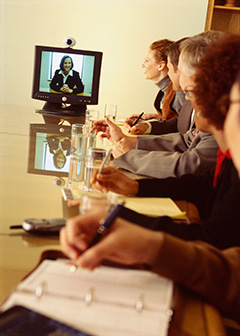How to Become a Meeting, Convention, or Event Planner About this section

An important part of a meeting planner’s job is choosing venues and negotiating rates.
Applicants should have at least a bachelor's degree and some work experience related to planning.
Education
Many employers prefer applicants who have a bachelor's degree and related work experience in hotels or planning. The proportion of planners with a bachelor's degree is increasing because work responsibilities are becoming more complex and because there are more college degree programs. If an applicant’s degree is not related to hospitality management, employers are likely to require at least 1 to 2 years of related work experience.
Meeting, convention, and event planners come from a variety of academic disciplines. Some related undergraduate majors include marketing, public relations, communications, business, and hospitality management. Planners who have studied hospitality management may start out with greater responsibilities than those from other academic disciplines. College students may also gain experience through an internship or by planning meetings for a university club. In addition, some colleges offer continuing education courses in meeting and event planning.
Work Experience
Some event planners enter the profession by gaining experience in a related occupation, such as a catering coordinator. For example, catering coordinators may begin planning smaller events, including weddings. As they gain experience and establish their reputation, they may start their own wedding planning business.
Once hired, planners learn many skills through experience. Entry-level planners generally begin by performing small tasks under the supervision of senior meeting professionals. Those who start at small organizations have the opportunity to learn more quickly because they must take on a larger variety of tasks.
Advancement
To advance in their careers, planners should volunteer to take on more responsibility and find better ways of doing their job. The most important factors in advancement are demonstrated skill, determination, and respect from peers. Because formal education is also increasingly important, those with limited experience may enhance their standing by enrolling in event planning courses offered by universities or professional associations.
As meeting, convention, and event planners establish themselves, they are given greater responsibility. This may mean taking on a wider range of duties or moving to another planning specialty to gain more experience. For example, a talented planner may be promoted from conference coordinator, with responsibility for meeting logistics, to program coordinator, with responsibility for speakers and event programming. The next step up may be to meeting manager, with responsibility for supervising all parts of the meeting. Entry-level planners tend to focus on meeting logistics, such as registering guests and setting up audio/visual equipment, while experienced planners manage interpersonal tasks, such as client relations and contract negotiations. With significant experience, meeting, convention, and event planners can become independent consultants or executive directors of associations.
Certification
The Convention Industry Council offers the Certified Meeting Professional (CMP) credential, a voluntary certification for meeting and convention planners. Although the CMP is not required, it is widely recognized in the industry and may help in career advancement. To qualify, candidates must have a minimum of 3 years of meeting management experience, recent employment in a meeting management job, and proof of continuing education credits. Those who qualify must then pass an exam that covers topics such as adult learning, financial management, facilities and services, logistics, and meeting programs.
The Society of Government Meeting Professionals (SGMP) offers the Certified Government Meeting Professional (CGMP) credential for meeting planners who work for, or contract with, federal, state, or local government. This certification is not required to work as a government meeting planner; however, it may be helpful for those who want to show that they know government buying policies and travel regulations. To qualify, candidates must have worked as a meeting planner for at least 1 year and have been a member of SGMP for 6 months. To become a certified planner, members must take a 3-day course and pass an exam.
Important Qualities
Communication skills. Meeting, convention, and event planners communicate with clients, suppliers, and event staff. They must have excellent written and oral communication skills and be able to convey the needs of their clients effectively.
Composure. Planners often work in a fast-paced environment and must be able to think on their feet and remain calm under pressure.
Computer skills. Planners must be familiar with computers, database software, budgets, and online social media.
Customer-service skills. Planners must understand their clients’ needs. They must act professionally in a variety of situations, know how to keep an audience engaged, and help participants network with peers.
Interpersonal skills. Planners must be good at establishing and maintaining positive relationships with clients and suppliers. They should also be able to help event participants network with peers.
Negotiation skills. Planners must be able to negotiate service contracts that get the best prices for their clients.
Organizational skills. To provide high quality meetings, planners must be detail-oriented, good at multitasking, and able to meet tight deadlines. Many meetings are planned more than a year in advance, so long-term thinking ability is vital.
Problem-solving skills. When problems arise, planners must be able to come up with creative solutions that satisfy clients.









